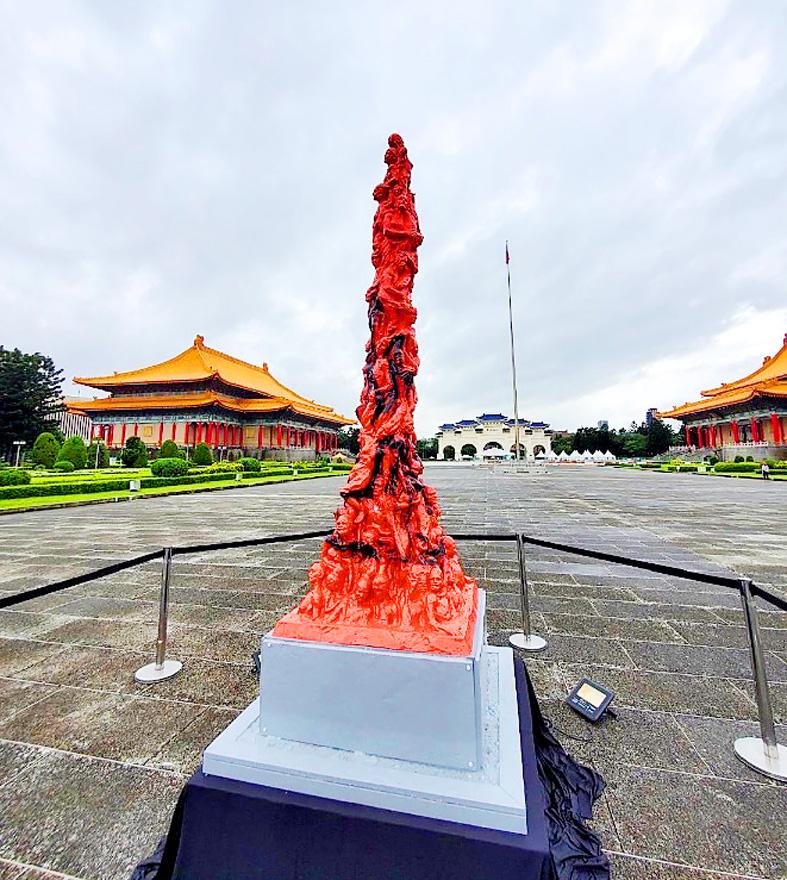The New School for Democracy yesterday said it would hold the person who vandalized a replica of the Pillar of Shame sculpture accountable and demand an apology from them.
The original sculpture, created by Danish artist Jens Galschiot, was installed at the University of Hong Kong for 23 years before authorities destroyed it on Dec. 22 last year for allegedly contravening Hong Kong’s National Security Law.
With the artist’s approval, a replica was made and unveiled at a memorial in Taipei for the 33rd anniversary of the Tiananmen Square Massacre on June 4. It is now part of an exhibition held by the New School for Democracy in remembrance of the 1989 democratic uprising in China.

Photo Courtesy of the New School for Democracy
At 8:55am yesterday, black paint was found sprayed across the pillar. After reviewing surveillance footage in the Chiang Kai-shek Memorial Hall, the Taipei City Police Department’s Zhongheng First Precinct identified and arrested a suspect.
New School for Democracy chairman Tseng Chien-yuan (曾建元) said that previous Tiananmen Square memorial events have been disrupted by similar incidents, adding that a mentally disabled person was once told to knock down an artwork on display.
Yesterday’s incident was meant as a warning to Taiwanese that they should not discuss the incident, Tseng said, adding that “if they succeed in silencing Taiwanese, they could silence Chinese around the world.”
The political rights group said in statement that it condemns all forms of violence, whether it be the Tiananmen Square Massacre in Beijing, the destruction of the Pillar of Shame last year in Hong Kong or the defacement of the 3D-printed Pillar of Shame replica in Taipei, and would never compromise on the matter.
“We will insist on pursuing legal and political responsibility for the perpetrator and their accomplices, and demand an apology,” it said.
“The act of vandalism not only destroys the artwork, but also supports all atrocities and crimes against humanity. It also challenges Taiwan’s constitutional order that guarantees creativity, freedom of thought and freedom of assembly,” it added.

US climber Alex Honnold is to attempt to scale Taipei 101 without a rope and harness in a live Netflix special on Jan. 24, the streaming platform announced on Wednesday. Accounting for the time difference, the two-hour broadcast of Honnold’s climb, called Skyscraper Live, is to air on Jan. 23 in the US, Netflix said in a statement. Honnold, 40, was the first person ever to free solo climb the 900m El Capitan rock formation in Yosemite National Park — a feat that was recorded and later made into the 2018 documentary film Free Solo. Netflix previewed Skyscraper Live in October, after videos

NUMBERS IMBALANCE: More than 4 million Taiwanese have visited China this year, while only about half a million Chinese have visited here Beijing has yet to respond to Taiwan’s requests for negotiation over matters related to the recovery of cross-strait tourism, the Tourism Administration said yesterday. Taiwan’s tourism authority issued the statement after Chinese-language daily the China Times reported yesterday that the government’s policy of banning group tours to China does not stop Taiwanese from visiting the country. As of October, more than 4.2 million had traveled to China this year, exceeding last year. Beijing estimated the number of Taiwanese tourists in China could reach 4.5 million this year. By contrast, only 500,000 Chinese tourists are expected in Taiwan, the report said. The report

Temperatures are forecast to drop steadily as a continental cold air mass moves across Taiwan, with some areas also likely to see heavy rainfall, the Central Weather Administration (CWA) said. From today through early tomorrow, a cold air mass would keep temperatures low across central and northern Taiwan, and the eastern half of Taiwan proper, with isolated brief showers forecast along Keelung’s north coast, Taipei and New Taipei City’s mountainous areas and eastern Taiwan, it said. Lows of 11°C to 15°C are forecast in central and northern Taiwan, Yilan County, and the outlying Kinmen and Lienchiang (Matsu) counties, and 14°C to 17°C

STEERING FAILURE: The first boat of its class is experiencing teething issues as it readies for acceptance by the navy, according to a recent story about rudder failure The Hai Kun (海鯤), the nation’s first locally built submarine, allegedly suffered a total failure of stern hydraulic systems during the second round of sea acceptance trials on June 26, and sailors were forced to manually operate the X-rudder to turn the submarine and return to port, news Web site Mirror Daily reported yesterday. The report said that tugboats following the Hai Kun assisted the submarine in avoiding collisions with other ships due to the X-rudder malfunctioning. At the time of the report, the submarine had completed its trials and was scheduled to begin diving and surfacing tests in shallow areas. The X-rudder,